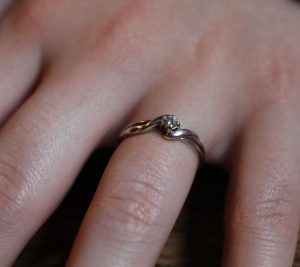
There are not only various cuts, styles, and qualities of diamond rings, but there are also rings that contain other precious stones, including rubies, sapphires, and peridots. The bands can be various metals of different qualities, forged into unique and surprising shapes. And we’re just getting started!
We want to make this process as free from stress and confusion as possible for you. So keep reading to learn more about the four best tips for finding the perfect engagement ring for your loved one.
-
Scout Out Possibilities Online First
One of the beauties of the age we live in—the Internet Age, in this case—is that we have no shortage of sources of inspiration for things like this. There are countless websites and social networks that have pages, threads, and even videos dedicated to engagement rings, such as Pinterest and Instagram. You can even watch video reviews of various engagement rings on YouTube, which can also steer you away from rings with poorer quality stones.
-
Get Educated on Stone Quality

This includes the clarity of the stone, the color of the stone, the cut of the stone, and the carat level of the stone. The higher the color value, the lower the carat value and the lower the color value, the higher the carat value, and thus the price.
Those are the basic rules of judging a diamond’s quality, but there are many sources that go into further detail, which you can find all over the internet, including educational videos on YouTube. However, if you’ve already selected your jeweler, they can typically provide you with all the important information you need and explain the nitty gritty details, such as the D to Z color scale and the clarity scale.
-
Find a Jeweler You Trust
Again, if you’ve already found a jeweler you like, you’re all set for this one. However, selecting the right jeweler isn’t always the easiest thing to do. You want a jeweler who knows his or her stones, but also a jeweler who has credentials and even diamond certification from an independent gemstone certification body, such as certification from the Jewelers of America (or the JA) or the Graduate Jeweler Program at the Gemological Institute of America (or the GIA).
There are various levels of certification from programs such as these, ranging from regular bench jeweler all the way up to a master level bench jeweler, as well as certifications in sales, management, and custom order jeweling. When it comes down to it, you can likely trust a jeweler with one of those plaques hanging on their wall. You can also find jewelers in your area by using many of the websites for these certification locations.
The jeweler can also earn your trust by walking you through all the details of the stones you’re examining, whether it’s showing you the gemstone’s cut through a microscope or showing you the color grading compared to other stones he or she has on hand. It’s also good to make sure that the jeweler has a fair return policy before making your decision.
-
Do One Last Double Check on the Stone’s Quality

After all, this is going to go on your spouse’s hand for the rest of your lives together. You can get this second opinion by sending your stone into a third party laboratory that handles gemstone appraisal. These labs include the aforementioned GIA, the American Gem Society (or the AGS), or the International Gemological Institute (or the IGI), among others.
These are four tips you can use for finding your perfect engagement ring for that special someone. Consider these, and you’ll manage to guarantee a smile on your true love’s face!

